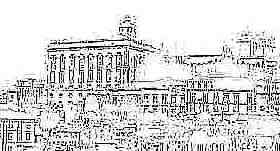

![]()
 Updated UF European
Studies Offering Spring 2011
Updated UF European
Studies Offering Spring 2011 
![]()


![]()
 Updated UF European
Studies Offering Spring 2011
Updated UF European
Studies Offering Spring 2011 
![]()
T 4th-5th, MAT 102 , Th 4th, MAT 5. Prof. Charles A.
Perrone. Grinter 335, 392-2100, perrone@ufl.edu
A course on the Western-most nation of Europe, Portugal, in the light of humanistic inquiries into encounter, cultural conflict, expansion, colonialism, and globalization. Through historically-situated forms of expressive culture, primarily literature, the class will follow a series of occurrences and themes: the emergence of kingdom, trend-setting maritime navigation, the age of exploration and "discovery," wonder at New World phenomena, decline of power, relic-making and nostalgia, attempts at revitalization, self-examination through northern European lenses, political modernity, dissolution of colonial vestiges, and psycho-imperial remains. Materials consider the national in relation to the international, European and global alike, as well as the condition of women and/or gender configurations, in a broad sense involving fictional point of view, female authorship, literal themes, figurative representations and mythical currents, relationships, patriarchal aspects, consciousness-raising, and political transformations. The course will draw on some conventional parameters, e.g. influence , epochal style and aesthetic schools (medieval to renaissance, baroque, neo-classical, romantic, realist, modernist, and contemporary). While crossing some cultural boundaries over the centuries, the organizing focus will remain Lusitanian, whether through articulations with European movements in the arts or approaches to national status, including confrontations of European consciousness in the New World. In sum, the course will present and examine Portuguese cultural production and consequences of interchange on many levels, probing the nature of depiction in different times, tensions between local and continental thought, dialectics of self-assertion and absorption of European currents, including im/migration. The semester begins with medieval musical discourse and completes the journey with Portuguese voices in the context of "world music," an eminently European construct with undeniable impact.
tentative syllabus (at CES site)
Links. For general reference, topically-specific information,
sites to be used for instruction:
Link to Page about Women's
Studies/Gender
Research in this class to be updated asap
A Collection of Home Pages about Portugal (ideaman)
A comprehensive clearing house of European origin (startips)
Historical
Atlas, Maps of Portugal, kingdom to nation
European Voyages of Exploration (U. Calgary)
Web Encyclopedia entry on Portugal
Contemporary
Portuguese Culture (instituto-camžes)
Last update: Jan. 11, 2011